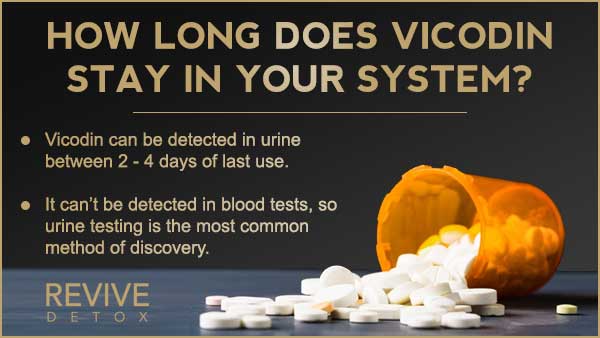Vicodin is a commonly prescribed painkiller and the abuse and overdose of this popular opioid is on the rise. The DEA states there were roughly 16,000 deaths related to opioids in the year 2010.
Although it’s not the strongest drug on the market, it does eliminate moderate to severe pain and can also be used to bring down fevers.
So, how long does Vicodin stay in your system?
The answer to that question lies in the makeup of the drug. Vicodin contains both opioid and non-opioid properties including acetaminophen and hydrocodone.
Both substances are addictive.
How Long Does Vicodin Stay in Your Urine?
Vicodin does not stay in your system as long as some other addictive drugs, but it can be detected in urine between 2 – 4 days of last use. It can’t be detected in blood tests, so urine testing is the most common method of discovery.
Detection of Vicodin through urine tests or other means can also be affected by your age, body weight and mass, by the presence of other drugs in your system and by how well your liver is currently working.
What Are the Effects of Long-term Vicodin Use?
Although it’s an effective painkiller, prolonged use of Vicodin can lead to serious illness as some of the side effects can become severe. Side effects may include:
- Nausea
- Dizziness
- Confusion
- Constipation
- Drowsiness or sleep disturbances
- Impaired judgement
- Slower breathing
Long-term use can also lead to severe liver damage and the risk of Vicodin overdose is also a major concern.
What Are the Signs of a Vicodin Overdose?
How long does the effects of Vicodin last? If Narcan is administered soon after symptoms appear the effects can be reversed and the person can revive almost immediately. Which is why it’s so important to recognize the signs of a Vicodin overdose.
- Difficulty, slow, or stopped breathing
- Extreme drowsiness or sleepiness
- Coma or loss of consciousness
- Blue skin, fingernails, or lips
- Stomach spasms or seizures
- Fainting or weak muscles
- Pupils narrowed or widened
- Clammy and cold skin.
Some of the above signs are more obvious than others and not all signs may be apparent during an overdose.
What Are the Symptoms of Withdrawal from Vicodin?
Withdrawal symptoms from Vicodin can range from the minor to the severe and can look very similar to withdrawal from Heroin. This is because both substances contain opioids. Withdrawal should always be undertaken with supervision from medical professionals or rehabilitation centers.
Because of the length of time that Vicodin can stay in your system, some of the symptoms you can expect to experience are:
- Insomnia and sleep disturbances
- Pain throughout the body and muscles
- Restlessness and fidgeting
- Nausea and vomiting
- Diarrhea
- Cold sweats
- Lack of appetite
How to Decide If It’s Time to Stop Using Vicodin
If you’re wondering how long Vicodin stays in your system, then you may also be considering giving up the drug. Despite the unpleasantness of withdrawal symptoms, the long-term effects of Vicodin use can be more severe.
How do you know if you need to stop taking Vicodin? Answer the following questions:
- Are youexperiencing mood swings, paranoia, or extreme anxiety?
- Are you constantly checking your Vicodin to ensure you have enough?
- Are you having problems focusing or staying on task?
- Have other people spoken to you about your Vicodin use?
All of the above may be signs you have an addiction to Vicodin. If you’re experiencing any of these, or other symptom you believe may be due to Vicodin, please consult a medical professional.





